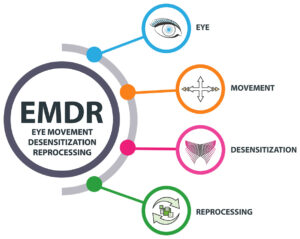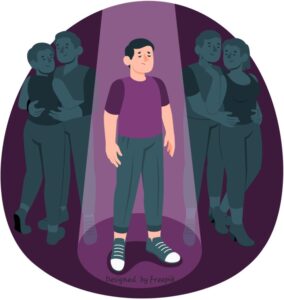Persistent depressive disorder or dysthymia is a mild but chronic form of depression. Depression is a mood disorder that involves your body, mood, and thoughts. It affects the way you eat and sleep, thinks about things, and feel about yourself.
Even though the persistent depressive disorder is not as severe as major depression, it is not the same as being unhappy or in a “blue” mood. A person suffering from dysthymia may lose interest in normal day-to-day activities, feel hopeless, lack productivity, and have low self-esteem and an overall feeling of inadequacy. These feelings of hopelessness and emptiness last for years and may significantly interfere with your personal as well as social life. Dysthymia isn’t a sign of weakness or something that can be wished away. The only way to get better or be in control of your symptoms is by seeking proper professional help.
Symptoms of dysthymia:
Persistent depressive disorder or dysthymia symptoms usually come and go over a period of years, and their intensity can change over time. But the typical symptoms are present for more than two months at a time. In addition to this, an individual may experience major depressive episodes before or during persistent depressive disorder — this is called double depression.
Symptoms of persistent depressive disorder that can cause significant impairment to the individual may include:
- Complete loss or lack of interest in daily activities
- Persistent feeling of sadness, emptiness, and Hopelessness
- Constant lack of energy and fatigue
- Low self-esteem and self-criticism
- Trouble concentrating and indecisiveness
- Irritability or excessive anger
- Lack of excitement
- Decreased productivity and avoidance of social activities
- Ridden with feelings of guilt and worries of the past
- Poor appetite or overeating
- Sleep problems such as fitful sleep, inability to sleep, early morning awakening, or sleeping too much
Diagnosis and Other mental illnesses linked with dysthymia:
For a person to be diagnosed with dysthymia he/she n this condition must be in a depressed mood for at least 2 years (or one year in children and adolescents), along with at least 2 of the above symptoms.
Most of the symptoms of this illness are present in other mental health conditions, thus, one shouldn’t try to self-diagnose. Conditions that may be linked with dysthymia include:
- Major depression, bipolar disorder, and other mood disorders
- Anxiety Disorders
- Substance abuse and addiction
- Personality disorders
- Suicidal thoughts or behavior
- Chronic pain and general medical illnesses
A diagnosis is done by a mental health professional after a careful psychiatric exam and examining extensive medical history.
Causes of Dysthymia:
There is no clear cause of the persistent depressive disorder. Psychologists suspect that there may be more than one cause, such as:
- Biological differences. People with dysthymia may have physical changes in their brains. The significance of these changes is still uncertain, but many researchers believe that they (biological difference) may eventually help pinpoint causes.
- Brain chemistry. A chemical imbalance within the brain is likely to play a role in depression. Recent research indicates that changes in the function and effect of neurotransmitters and their interaction with neurocircuits play a key role in maintaining mood stability. This may play a significant role in depression and its treatment.
- Inherited traits. Persistent depressive disorder or dysthymia is believed to be genetic as it appears to be more common in people whose blood relatives also have the condition. Researchers are still trying to find genes that may be involved in causing depression.
- Life events. Similar to major depression, traumatic events such as losing a loved one, financial problems, or a high level of stress can trigger persistent depressive disorder in some people
Treatment of Persistent depressive disorder:
As dysthymia is a chronic illness and usually lasts for longer than 5 years, long-term treatment is often required. Treatment of dysthymia may include one or a combination of the following:
- Medicine. There are a variety of different medicines are available to treat depression. It often takes about 4-6 weeks for anti-depressants to have a full effect as the severity of the illness differs from individual to individual. It’s important to keep taking the medicine for the treatment, even if it doesn’t seem to be working at first. It’s also important to not go off the medicine without consulting your healthcare provider. Some people have to switch medicines or add medicines depending on their response to the medication.
- Therapy. Cognitive-behavioral or interpersonal therapy is the most sought-after form of therapy for this illness. CBT focuses on changing distorted views of yourself and your environment. Therapy also strives to improve relationship skills and identify and manage stressors.
Due to the chronic nature of the persistent depressive disorder, coping with depression symptoms can be challenging, but a combination of psychotherapy and medication can be effective in treating it.
Following strategies to inculcate in order to manage dysthymia at a personal level:
-
- Take steps to control stress. Set realistic goals and don’t take on too much then you can handle. Try to increase your resilience and boost your self-esteem little by little
- Reach out to family and friends, especially in times of crisis. Confiding in someone may help you weather rough spells.
- Eat healthily and exercise. Eating well-balanced meals and exercising are proven to improve mood.
- Stay away from alcohol and drugs. These are just temporary distractions and may make depression worse.
- Be patient with yourself and the treatment. Try not to rush things. Let everything go at its pace and try not to expect a lot from any situation.
Feel free to reach out to us for counseling and psychotherapy sessions from our trained psychologists, and psychotherapists.




